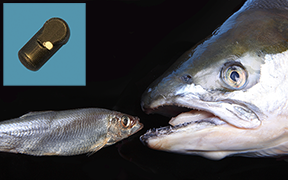V5D 180-kHz Predation Tag
-
Overview
Are you still tracking what you think you’re tracking?
Take the guesswork out of predator prey interaction with the V5 Predation Tag
For several decades, researchers have been using underwater acoustic telemetry technology to study animal behaviour, movement, physiology and survival in marine and freshwater environments. But to determine and understand predation events, scientists have relied on guesswork or applied subjective criterion to data analysis which could potentially lead to inaccurate results.

VEMCO’s V5 Predation Tags permit exploration of novel questions and important research while increasing the certainty with which researchers can interpret their telemetry results.
The predation tag provides a direct measure of digestion wherein stomach acids digest a polymer. It is a superior technique to using indirect measures of activity such as acceleration.
The tag ID changes approximately 3 to 5 hours after predation and its trigger success rate is 100%.
Over the past two years, we have conducted over 140 control and experimental trials (12°C to 24°C) with an independent University research group. Details about the trials can be found in this recently published research paper.
Compatible with VEMCO’s new HR2 receiver and the VR2W-180 kHz receiver, the predation tag supports two acoustic transmission systems: PPM (Pulse Position Modulation) and HR (High Residence). For more information, see Downloads section.
For proper handling, please read the Sensor Tag Handling and Disinfection Procedure.
U.S. Patent No. 9,526,228
U.S. Patent No. 9,095,122 B2
European Patent No. 3,114,185
China Patent No. 2015 8001 2483.XKey Features
- Validate mark recapture survival models
- Separate tag mortality form natural mortality
- Investigate predator-prey behaviour
- Investigate impacts of invasive predators on native species
- Study trophic energy transfer on reefs
-
Gallery

-
Specifications
Physical Specifications Frequency 180 kHz Length 12.7 mm Width 5.6 mm Weight in air 0.68 grams Power Output (dB re 1uPa @1m) 143 dB Trigger time 3 to 5 hours (temperature dependent -
Downloads